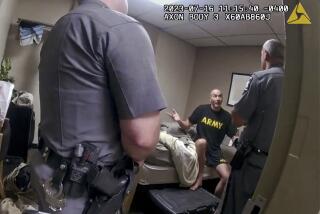Lewis’ Heart Was Abnormal; Early Tests Uncertain on Death
- Share via
Although a preliminary study by Massachusetts medical examiners found that Reggie Lewis’ heart was abnormal, enlarged and extensively scarred, it did not determine a cause of death, officials announced Wednesday in Boston.
As a result, the findings are inconclusive until more specific testing is concluded, experts said.
Lewis, a Boston Celtic forward, died eight days ago after collapsing while casually shooting baskets at Brandeis University in Waltham, Mass. He was 27.
Pathologists said they were unable to determine the cause of scarring, which might offer clues as to Lewis’ condition before he died. Officials are awaiting results from cardiac pathologists who are examining cells and tissues of the body’s heart wall. Such studies often take two weeks.
Lewis’ condition has become a medical mystery because of conflicting diagnoses after he collapsed during a Celtic game on April 29.
A group of 12 experts who first examined Lewis said he suffered a life-threatening heart disorder known as focal cardiomyopathy.
Lewis sought a second opinion from Dr. Gilbert Mudge at Brigham and Women’s Hospital in Boston and was told he suffered from a benign neurological disorder that causes fainting spells.
A third group of Southern California-based physicians examined Lewis last June, but they were unable to provide a conclusive diagnosis before he died. Those physicians warned Lewis he should not continue training before undergoing more heart tests, which had been planned for this week.
Preliminary findings also showed Lewis’ coronary arteries were normal. Toxicology screens showed no evidence of illegal drug use, it was announced.
In another development, Dr. Thomas Graboys, a member of the original team that examined Lewis and an associate of Mudge, said Mudge handled Lewis’ case properly.
“I believe that Dr. Mudge’s management was entirely correct in that he had a public posture, which was to embrace a benign diagnosis,” Graboys said. “But a private posture with the family that is very clear (was) that the jury is out and (Lewis) needed to be very, very carefully monitored.”
More to Read
Sign up for Essential California
The most important California stories and recommendations in your inbox every morning.
You may occasionally receive promotional content from the Los Angeles Times.













